Delving

Societa anonima cooperativa per la fabbricazione delle maioliche (Deruta, Italy):
Display Plate with a Man Striking a Heart on an Anvil (c. 1550)
" … grasped without really understanding what we're choosing …"
This work creating a Set List seems a bit different than the standard purposeful effort. Like you, I was exhorted to Start With The End In Mind, even though whatever end I might initially envision would have to be wanting, given that it was by definition not informed by the effort to determine it. That end, whatever I believed it could or should be, would just have to be different than I first imagined or it could not have been worth pursuing. So, Set Listing (if I might call my current occupation that), doesn't qualify as a standard engineering effort, either. The specs aren't nearly specific enough yet, and might never lend themselves to mechanical drawings. I sense that I am not so much pursuing, but Delving into.
Like all projects, this one began with a bright idea, a big, alluring statement of purpose, utterly vacuous at inception.
Reassurance
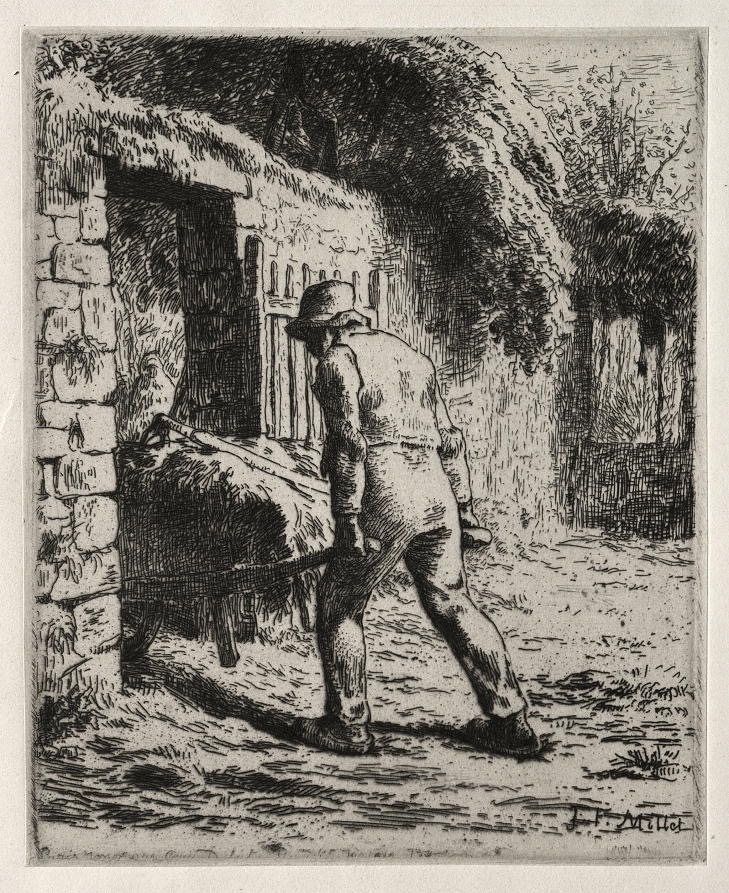
Jean-François Millet:
Peasant Returning from the Manure Heap (1855–56)
"I necessarily remain a novice at this work …"
Judging from how I seem to drag my feet into practicing, this creating a set list seems like hard work. Even the hardest work, though, might include some Reassurance, some occasional sense that it's not just hard but also rewarding. My anticipation decides much, and I too often anticipate some worst coming. This set-up leaves me surprised and sometimes even delighted when my effort produces some glimpse of goodness, when some of that old confidence shows, or when I seem to know what I'm doing again. A body of work long left idle awakens fitfully and requires Reassurance to fully awaken. Creating this set list was first just an idea, though I do not mean to demean its source since ideas seem capable of sparking most anything. Beginning again seems more daunting than was the original creation of these songs.
I sat before a small window in a cramped hotel room, guitar in hand.
Practice

Honoré Victorin Daumier: A zealous student practicing at home,
plate 6 from Les Baigneuses (1847)
"It's the pursuit of premise pursuing purpose …"
The old joke asks how to get to Carnegie Hall before disclosing: Practice, Practice, Practice. Of all human endeavor, certainly Practice stands near the most curious. I expect that we misunderstand it because I'm confident that I misunderstand it, mostly because I can't hardly stand to do it. It seems infused with purposeless, and I suppose that natively, Practice is always separate from purpose. It might be that Practice largely entails mustering a motivating backstory so as to make the effort tolerable if never entirely pleasurable. For me, it reeks of self discipline and self possession, a separation in preparation for making a connection. I often spend my practice time aching to be finished practicing and on to something more sociable and meaningful.
Still, if a musician or even a lowly songwriter ever expects to perform his work, it seems he must prepare somewhere.
CrimeScenes
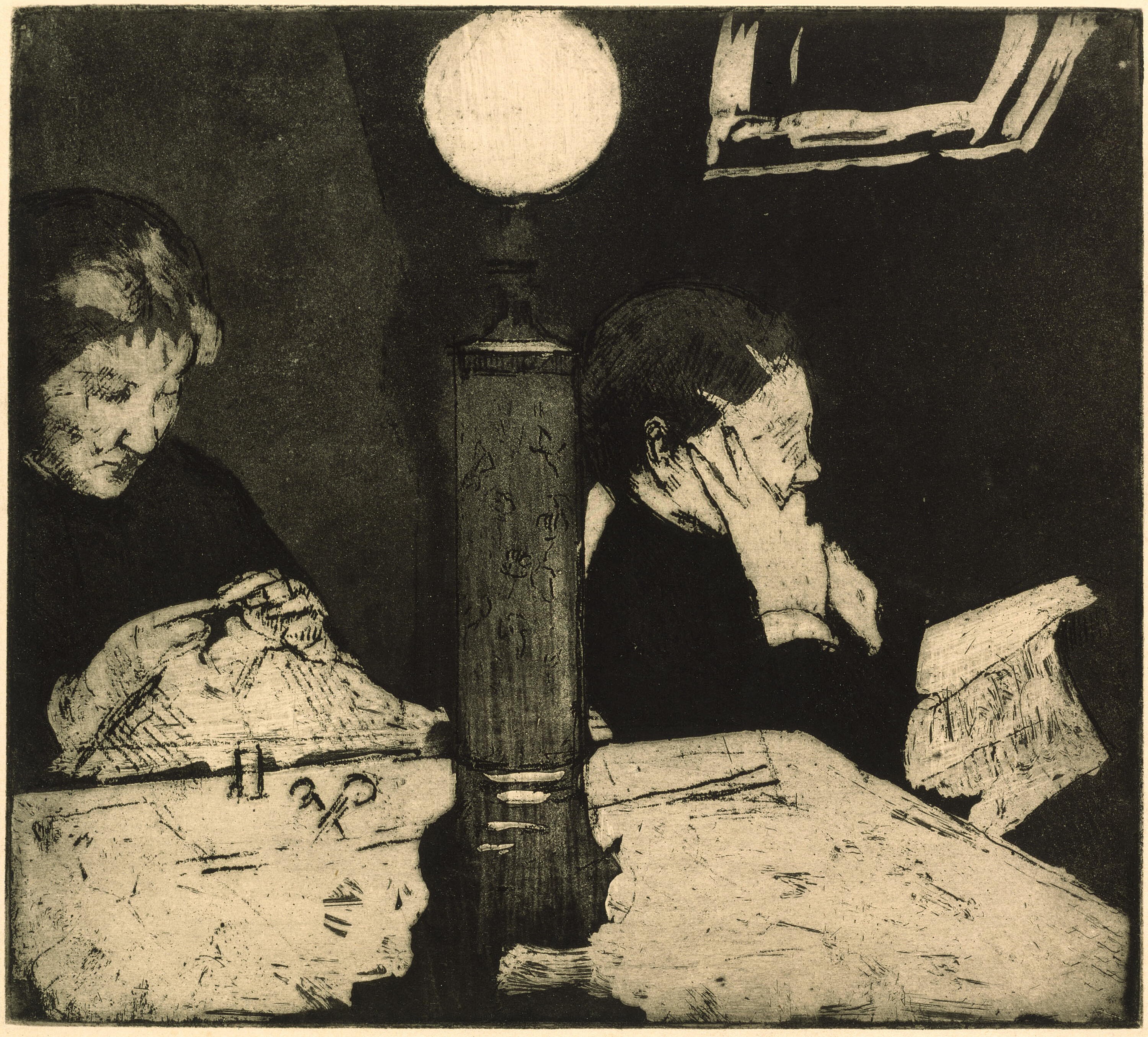
Mary Cassatt: Under the Lamp (c. 1882)
" … evidence of criminal conspiracy afoot."
Each song in a thirteen song collection of my original compositions evokes its source when I perform it. The situation, location, and conditions then present flood me, often almost overwhelming me, and sometimes succeeding in absolutely shutting me down. I am not always able to finish a song I've started for it transfers such an emotional load I cannot bear it in some moments, and I just have to stop. Other times, I'll get so distracted by the ginned up context that I'll forget the words. It's helpful, if deeply embarrassing, when The Muse reminds me of the next phrase after sensing that I somehow got lost on such tenaciously home turf. The scene of the original crime reappears each time, if, indeed, the birth of each song constituted a crime. If they were crimes, I could claim that they were innocent crimes of omission rather than of deliberate commission. I never once intended to capture that time, or any time, in any kind of bottle, but writing a song, any song, seems to inadvertently produce just that sort of result.
Room 327 in the La Posada in Alburquerue, originally built by Conrad Hilton, lord knows when, and featuring the most wonderful Spanish tile lobby.
RealPlay
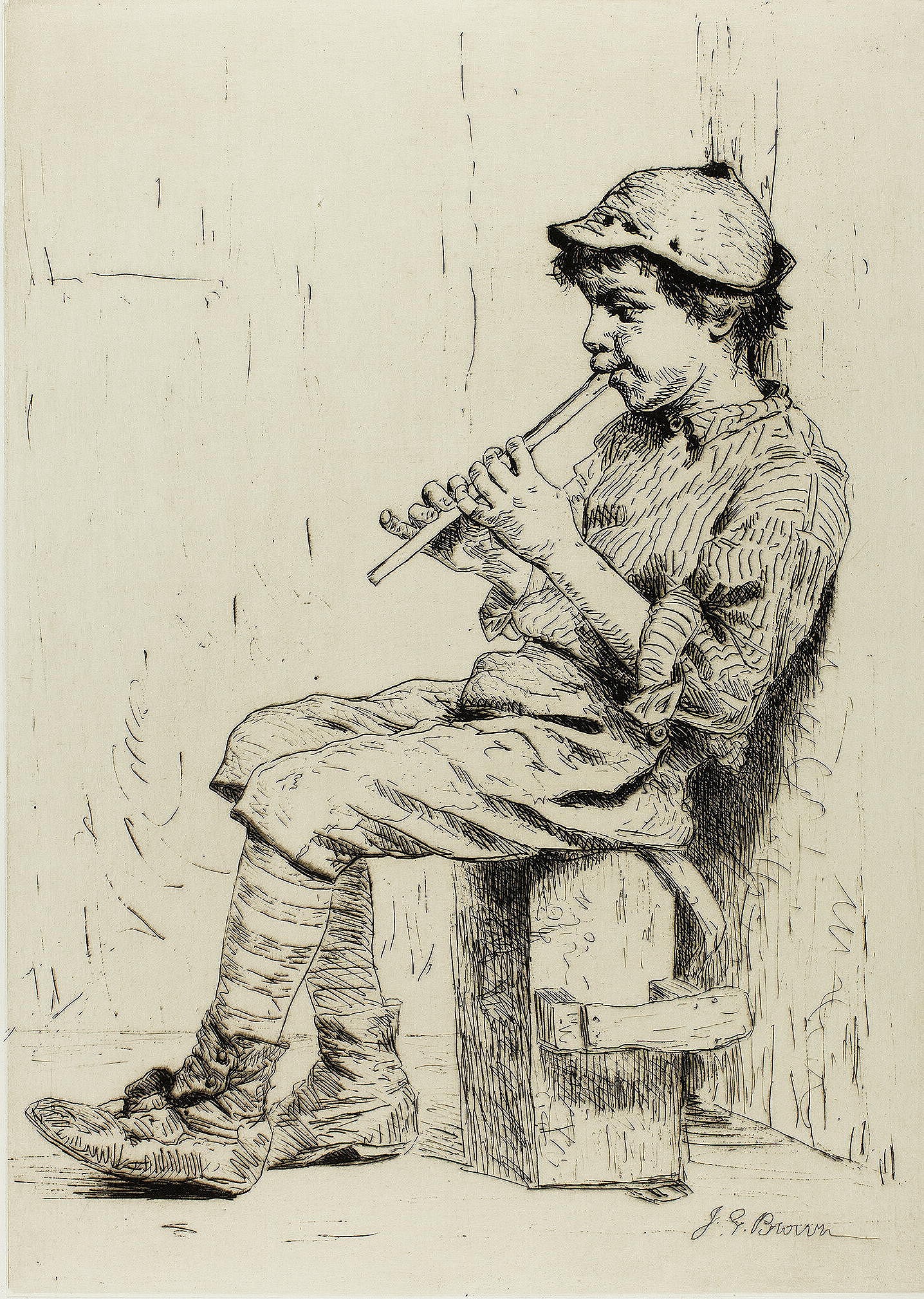
John George Brown: Boy Playing a Flute Date (c. 1860)
" … the play seems too real to be too serious."
Anyone raised under The Protestant Work Ethic should find confusing the concept of playing for work. I suppose all entertainers suffer from some of this muddle, with comedians perhaps suffering most, for they slave away in laughter mines more oppressive than South African diamond ones. Musicians, though, too, also deal with material most closely correlated with leisure. Their work is their audience's play. They are even said to "be playing" when they perform their work. They're supposed to at least appear light-hearted and, dare I say (in the most traditional way) gay whenever they're up on stage. Nobody pays good money to watch a morose bluesman perform. His lyrics might describe absolute despondency, but the ethic governing its presentation insists that the performer definitely not be suffering when recounting his humiliation at the hands of some two-timing nobody, his reported "baby." He's supposed to be above actually grieving over the experience and somehow, paradoxically, be absolutely reveling in it. "My baby left me, cha cha cha!"
The songwriter, too, suffers from expectations, or can if not properly disciplined.
RealWork

Paul Gauguin: The Large Tree (1891)
"It was an inconvenient time …"
I look at an old set list and I realize that it represents RealWork that I actually accomplished. Each title manifested the hard way; none came easy, thank heavens, for RealWork must be difficult if it ever hopes to become rewarding. Nor was I ever paid to create even the least or the very best of the songs appearing on that list. I created each as an act, and sometimes an extended act, of something very much like love. Not like love of country or of spouse, but of self, but not narcissistic love, more like the filial kind. I created none of my songs in the hope that I might one day make money off them. Well, I should amend that blanket statement by saying that I wrote precisely one song with the sincere hope of making money off it, at the encouragement of my then agent, who'd insisted that the only way I'd ever make any real money in "the business" would be to write a disco hit, so I set about attempting it. The result was the biggest piece of shit I ever produced. I will not play it for you even if you ask nicely. I won't even play it for myself. It was a blessing of a lesson, one which further solidified an understanding. RealWork's not for pay or for profit, but properly for the ages.
My understanding came slowly, the recognition that I had been training myself in RealWork since I'd started becoming addicted to my instrument, since I wrote that first song.
DiffsGiftering
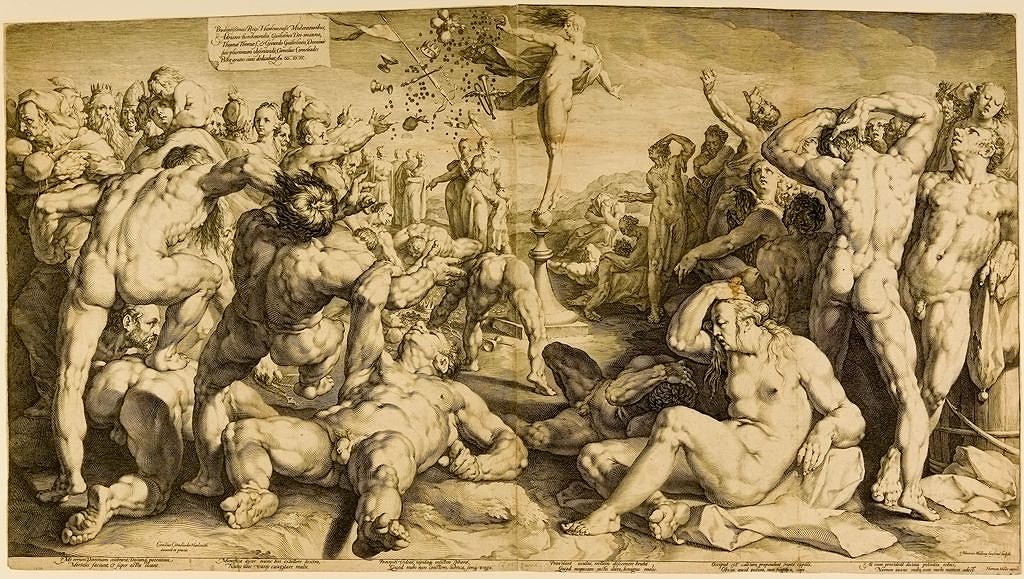
Jan Harmensz. Muller:
Blind Fortune Distributing Gifts (16th-17th century)
"Nobody ever requests the greatest gift they receive."
The ancients believed that Fortune distributed gifts to The Gods, rendering each unique. In more modern times, Fortune seems no less occupied bestowing gifts upon mere mortals. The Gods having been long ago gifted, Fortune's only alternative might have been long-term unemployment, an intolerable condition in a fundamental force of nature. It seems inarguable that different people seem to have been bestowed with different gifts. Some were seemingly born with the gift of gab while others' superpowers seem to quite naturally stifle them. It seems common enough that some aspire to achieve what for which they were never naturally gifted, with sometimes tragic results. When I attended Junior High, a purgatory between childhood and adulthood that every child must pass through, I was subjected to what was labeled a career assessment instrument. It purported to be capable of questioning a twelve year old kid and, by analyzing his responses, determine his best prospects for a career. I was declared a probable accountant, an appalling assessment I swore to resist with my heart and soul. I could not relate to the black and white photograph of a buzz cut geek in a short-sleeved white shirt and skinny tie, smiling beside a ten key machine. I dedicated myself to growing up to become anything but that!
It might be that such experiences weighed on me to the point that I would never fit into proper society.
SetTheory
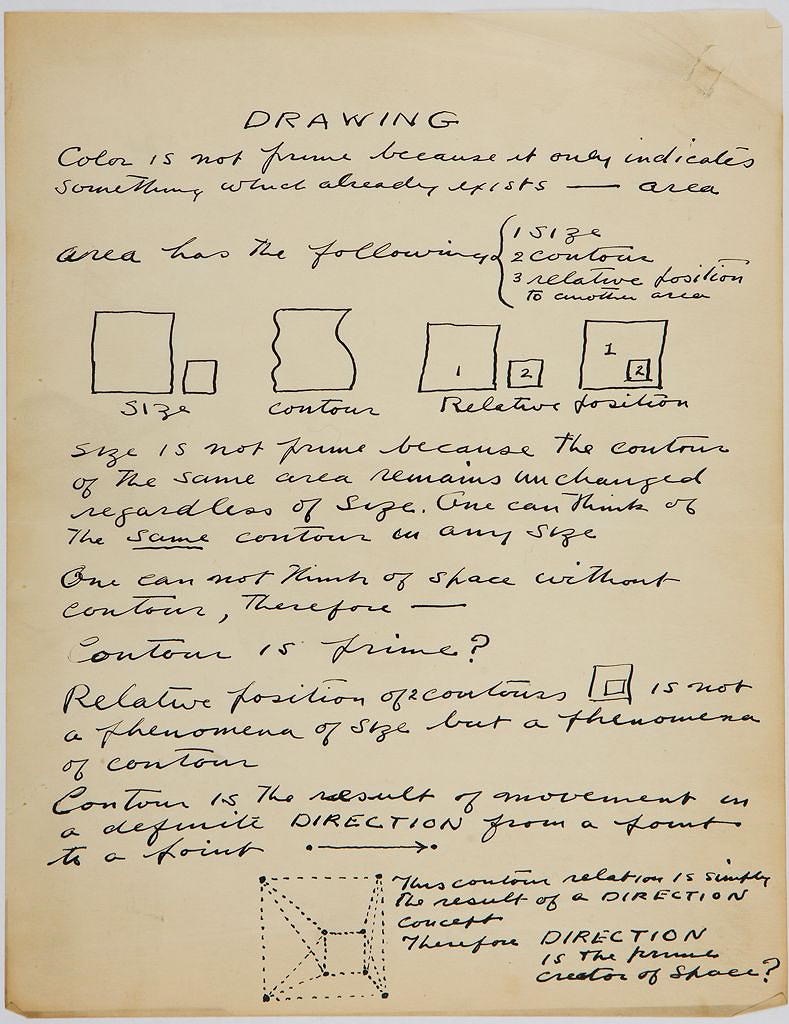
Stuart Davis: Art Theory Text with Diagrams (c. 1932)
" … employing the magic of SetTheory"
My first career, more than fifty years ago now, was that of a songwriter, an admittedly made-up career choice attractive because it required only informal study. My high school guidance counsellor declared me Not College Material, a designation I later learned actually meant Not High School Material, which cut me off from a common birth family exit. Further, I had declared myself a pacifist in the face of the Vietnam war, so the military didn't offer me an offramp, either. I pursued music, though to be fair, I really should declare that the music pursued me first, and my response was at least half defensive. I, like many in my generation, acquired a guitar addiction while still in grade school. I fell in love with the thing and dreamed in chords and rhythms. I'm convinced that it altered my DNA. Unlike most, I came to write my own songs and, through that high school within which I never belonged, I nurtured my identity performing on a tiny stage in front of an actual brick wall in a church basement coffee house replete with tiny tables and flickering candles. I later even learned to hitchhike.
I encountered my first sets in that basement.
CodaMysterious
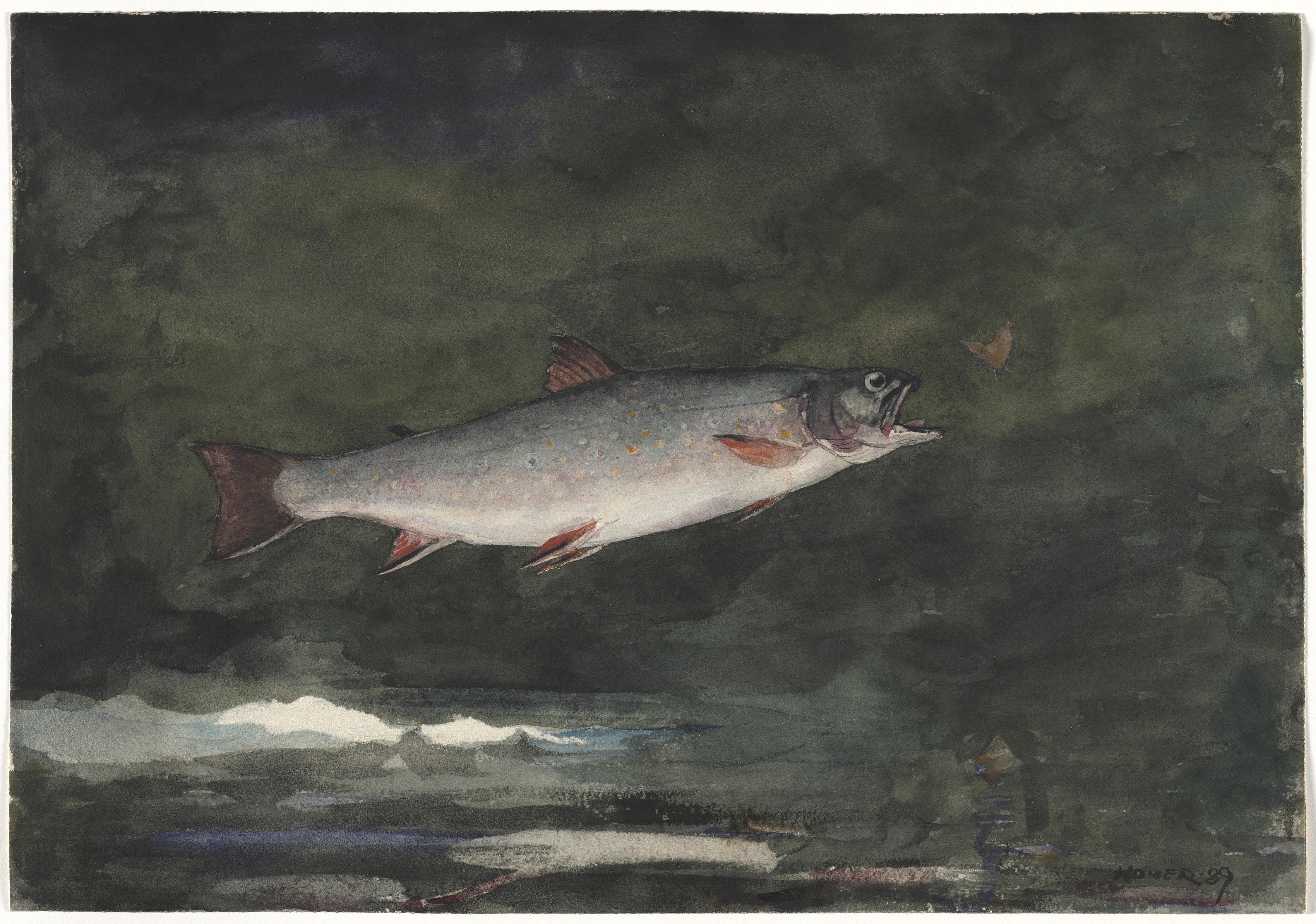
Winslow Homer: Leaping Trout (1889)
" … make way for the next day's fresh blade."
Reviewing my now extensive oeuvre,—an utterly unpronounceable word meaning 'collected works'—I see that I've written this story at least a half dozen times before, probably more. I variously labeled it BegEnding or one of its variants (BegsEnding, etc.), suggesting that an ending often also represents a beginning, perhaps even that endings tend to be infinite rather than definite. They often smear into the next story, to live beyond their pages. This result should not surprise me or my readers, since this operation, my operation, runs on precisely this sort of stuff. Enough never proves to be enough. Doneness doesn't just quit.
It might be that the most valuable element of any of my collections of stories doesn't actually inhabit any individual story or, indeed, any collection, either.
FinalFullDay
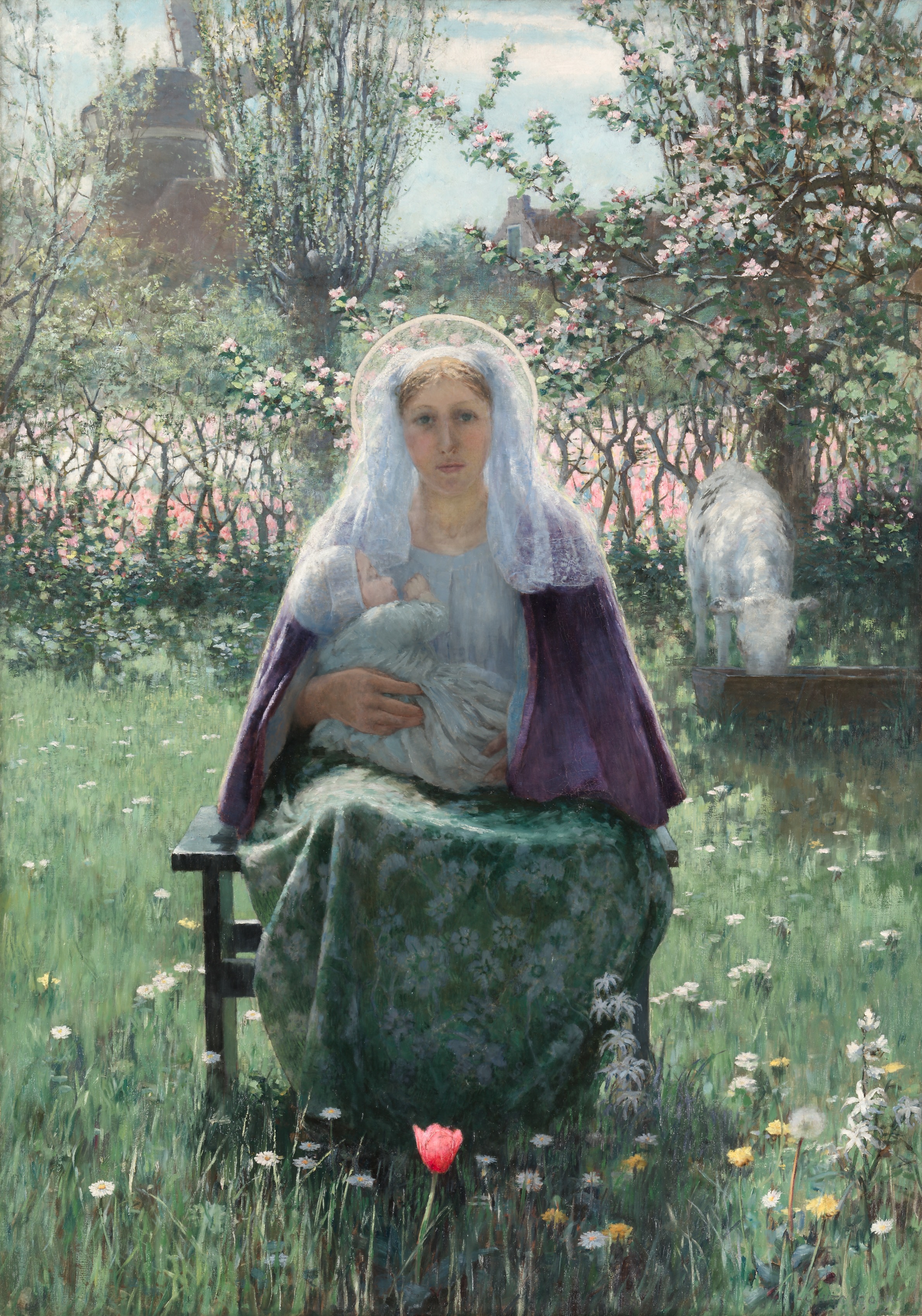
George Hitchcock: The Blessed Mother (1892)
" … trying to find someplace to fit into a finished picture."
What started as an experiment became a practice before changing back into an experiment again: Againing. The once full moon this morning displays only the thinnest sliver of itself, preparing to preside over an equinox, one seemingly delayed a full day beyond its usually 21st of the month appearance, scheduled to show up in this year, 2022, on the twenty-second, thanks, I guess, to the magic of Moon Mathematics. Moon Math can shave as well as add, rendering expected into slightly different forms, recognizable, but never precisely. Expectations come, I suspect, exclusively in regular shapes, while experience tends to slop over edges. We perceive similarities as well as differences, sensing familiar without fully believing when we've found it. Life still seems new, even after so much time spent both on and off the shelf of it. My sense of self still seems unfinished again, Againing.
What did I think I was doing?
ReMounting

Henri Toulouse-Lautrec:
The Hangover (Suzanne Valadon) (c. 1888)
" … permanently resolve nothing all over again again."
Months later and I still hadn't finished painting that first side of The Villa. I'd innocently believed when I started that I would have completed painting all three sides I'd planned to repaint this year, but I hadn't. I'd become an intermittent in practice. In theory, I almost always work continuously, diligently laboring until I finish a job. In practice, I lose my spot. This year, I could safely blame the weather. Too much rain early, then way too much heat later. Whatever, I could not maintain the natural rhythm of the work, let alone find it. I relegated myself into a odd-lot contractor, unable to reach scale or maintain cadence. My execution was therefore patchy. Oh, the emerging finished product looks fine, as if produced by continuous process, even if it was not. It took more effort as intermittent work than it could have possibly otherwise taken. As I near completion, I watch myself ReMounting that scaffolding one more time.
That first time climbing to the top resolved nothing.
Incompatible
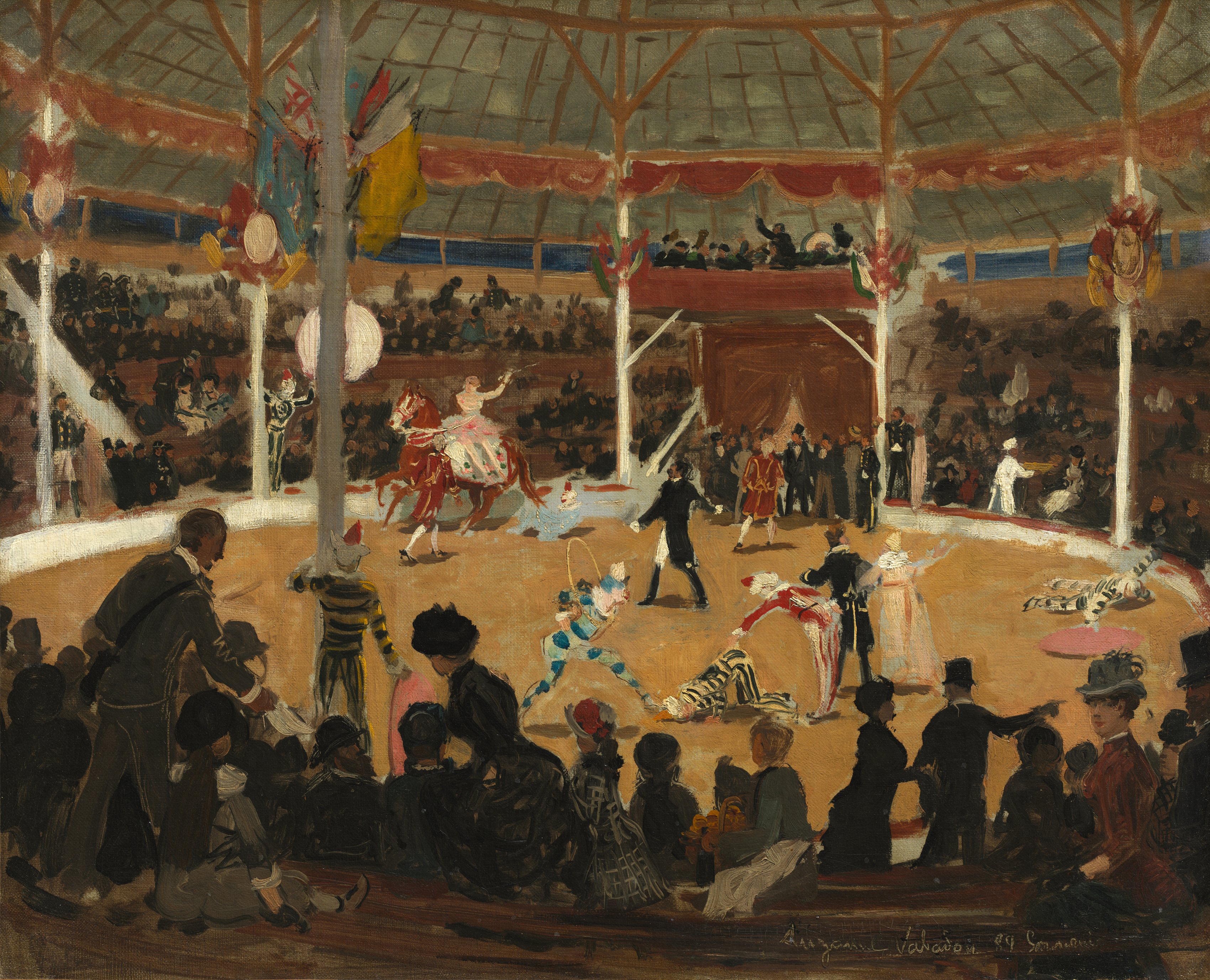
Attributed to Suzanne Valadon: The Circus (1889)
" … our relationship utterly depends upon us making the most generous possible interpretations …"
The Muse and I acknowledged last week that twenty-five years had passed since we met. Anyone might presume, then, that we're a compatible pair, and I suppose we are compatible, but only up to a point. In many ways, we have always been Incompatible. Our stars were never in complete alignment. We each contribute a fair measure of frustration to the relationship. We each have our ways of accomplishing things. Attempts to partner don't always fall apart, but they also don't always work. I've learned to not take these failings very seriously, for that's the point where Incompatibility begins to matter, where it starts breaking down a relationship, tearing asunder. North of serious, things work. South of there, they absolutely don't, and couldn't.
Both The Muse and I were married before, her once and me, twice.
CreatingContext
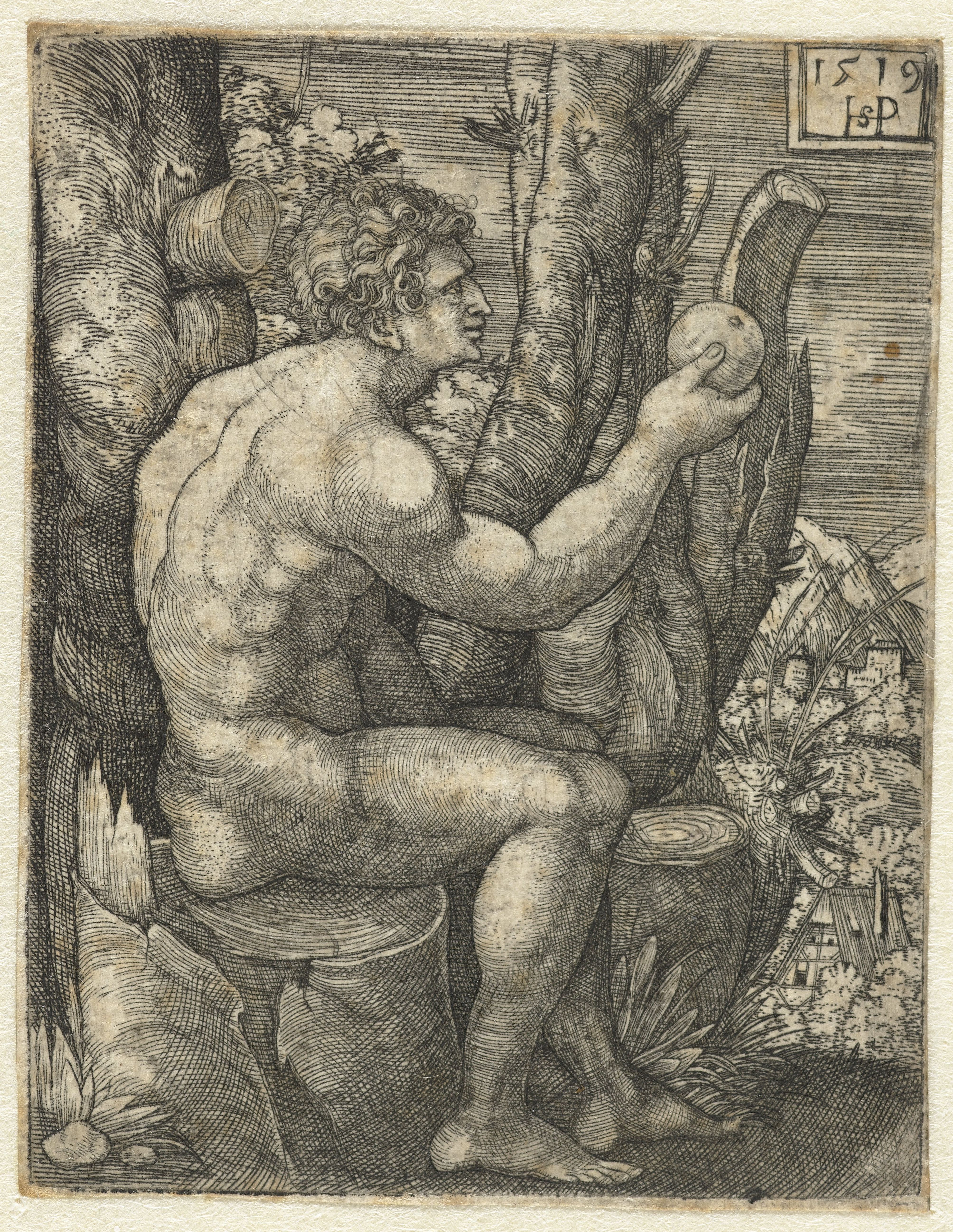
Hans Sebald Beham:
Adam zittend op boomstronk met appel in zijn hand
[Adam sitting on a tree stump with an apple in his sinning hand] (1519)
" … a seemingly secret path to actually achieving it …"
The Muse had been complaining for months about the trash wood pile on the front porch. The pile, the natural product of last year's Grand Refurbish, needed cleaning up and we both knew that it was my responsibility to clean it up, and yet that job had never risen to the top of my UnfinishedBusiness queue until yesterday. I knew that I'd have to clean up that mess before we could replace the brick pillars around the front porch, but that job had crept into the unlikely category as Summer threatened to turn into Fall. It was supposed to start in Late August. Further, just that morning, Our Carpenter Joel, in his role as prime contractor for the repillering job, had reported that the contractor he'd lined up last Spring had gone incommunicado, apparently communicating by not communicating that he'd decided not to do the job after all. Suddenly, there was even less urgency to clean up that pile.
It's not that I hadn't contributed considerable brain power to considering how to satisfy The Muse's request.
UnfinishedBusiness
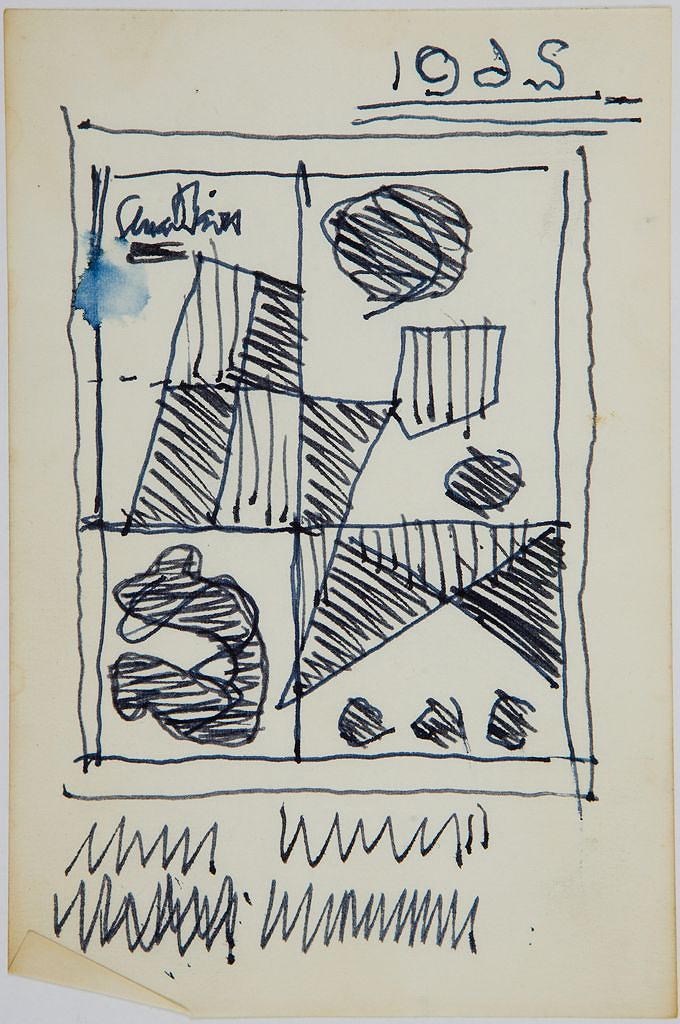
Stuart Davis: Study for “Unfinished Business” (1962)
" … one stumbles back out of what one stumbles into …"
The end of a season invites in the auditors to assess progress made. Nobody wants a disappointing auditor's report, but some seasons, conditions seem to conspire against success, against progress itself. For me, this result typically happens when I've managed to accumulate more obligations than I can successfully juggle. It never takes much, more like it tends to take no more than an ungainly mix of even small stuff. A single procrastinating act might set off a cascade of small avoidances which quickly accumulate into an overwhelming backlog, one which appears beyond anyone's means to dent, let alone to clear. This accumulation becomes my burden, invisible, perhaps, to everyone else, but front row center prominent for me. It weighs extremely heavily upon me, encumbering everything I attempt, dissuading me from even trying to clear the scales.
The Muse notices but wisely mostly declines to mention.
WindingDowner
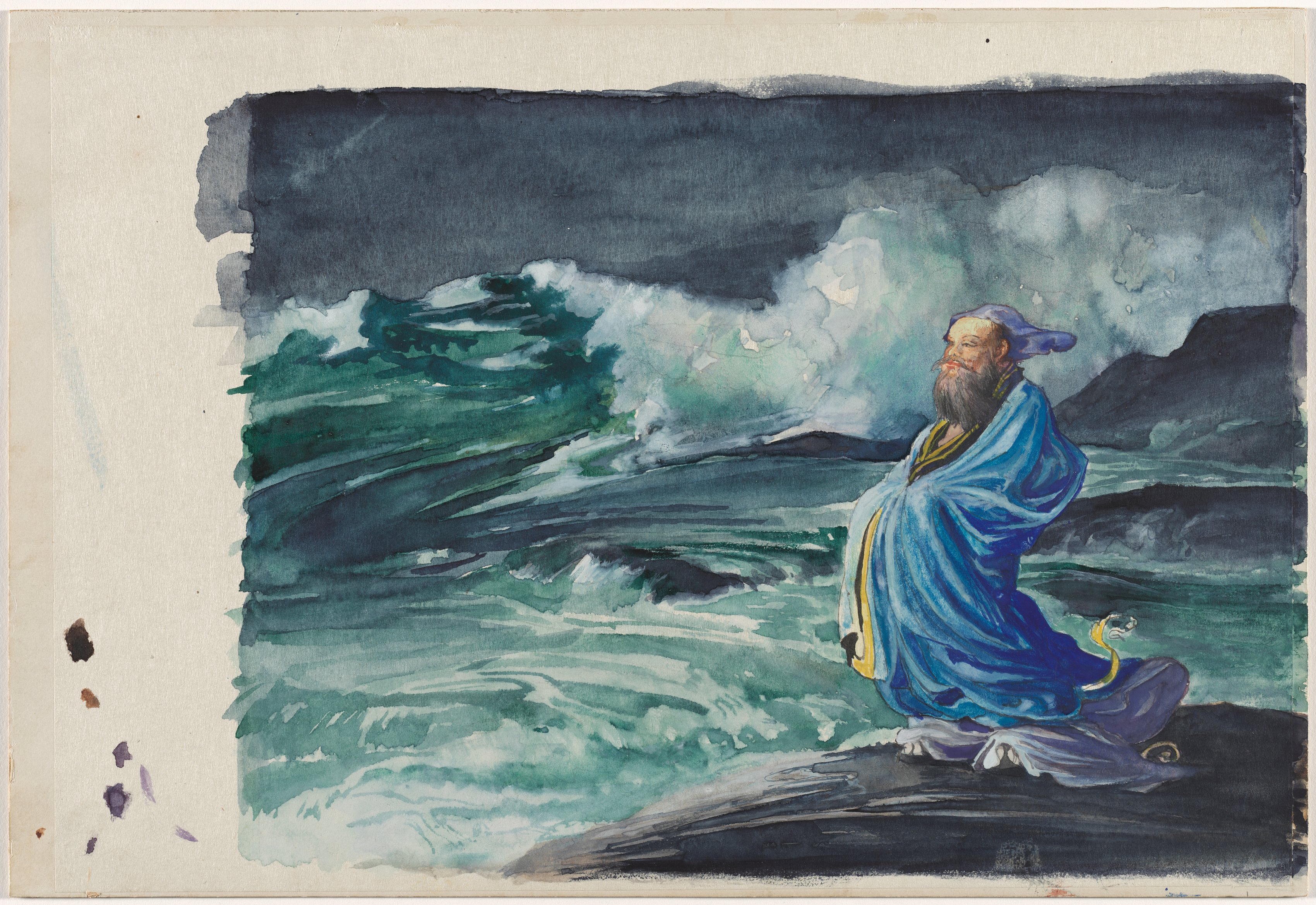
John La Farge: A Rishi Stirring Up a Storm (1897)
" … in preparation for an on-time arrival."
The two most dangerous parts of every airplane flight come at the beginning and at the ending of the flying. The flying itself, once aloft and leveled off at cruising altitude, becomes pretty routine, but both beginning and ending observe what the regulating authorities call Sterile Periods, where, by law, crew must remain focused upon their responsibilities. No chit chat and no playing mumbly-peg in the cockpit. Beginnings and endings remain serious business. Writing's no different, and, I suppose, if I researched any profession, I'd find a traditional respect observed for beginnings and for endings. An innocent oversight before departure can bloom into a crisis once away. In some ways, I suppose that every profession amounts to life or death since none of the time any of us invest proves to be refundable. We hasten slowly when starting and no more quickly when coming back to Earth.
This Againing Series, begun in sublime ignorance almost three months ago, has started making noises like it's just about ready to land at its destination, wherever that might be.
Adaptigrating
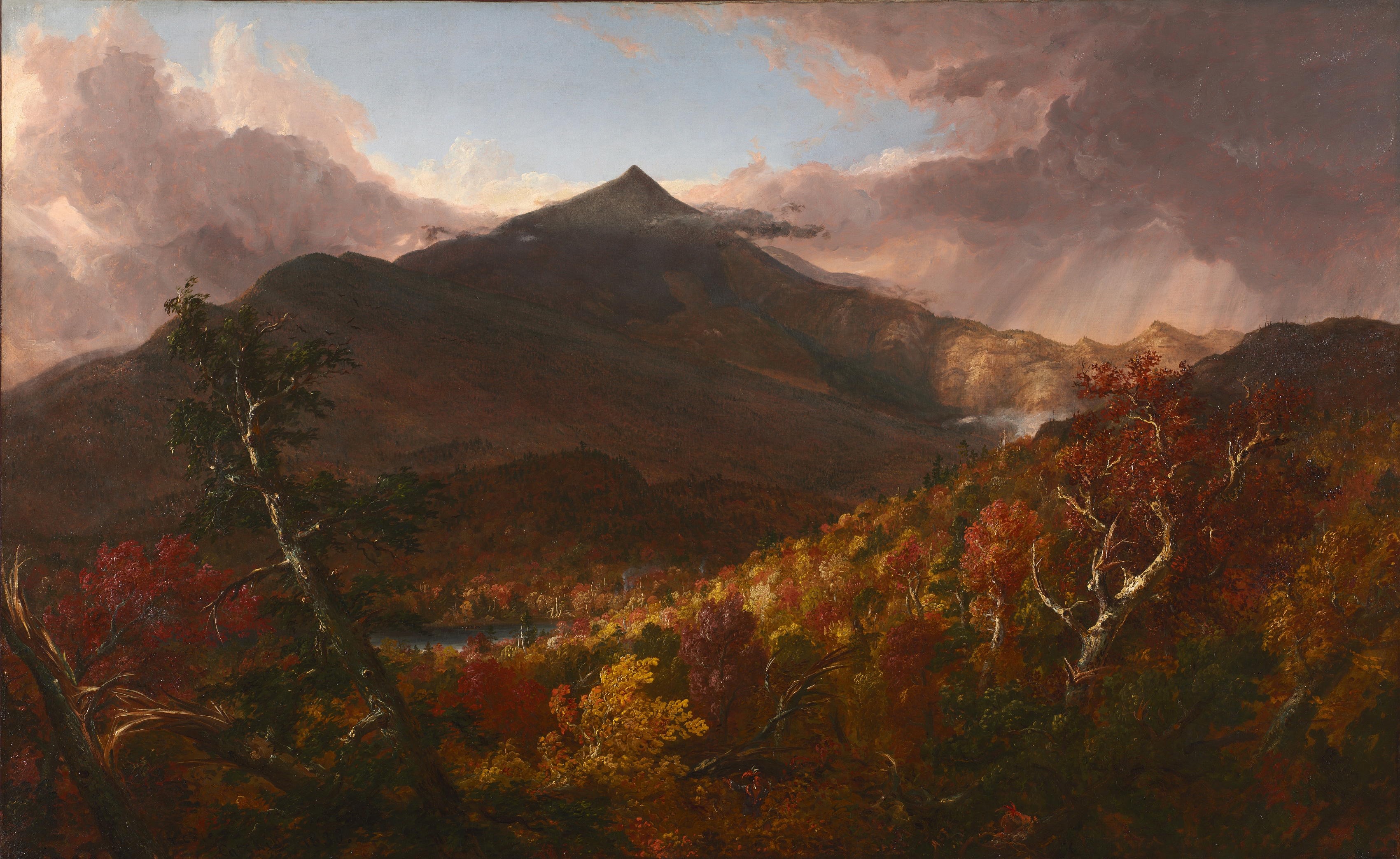
Thomas Cole: View of Schroon Mountain,
Essex County, New York, After a Storm (1838)
" … appearing more or less unbidden, wet and fearful …"
Anyone insisting that they grew up in the Good Old Days was not paying attention then. The Old Days I hail from would not nearly pass muster today. It was impossible then to find a decent loaf of bread in wheat country, and even the largest cities lacked a decent cup of coffee. People smoked with impunity and drank Coke® without irony. We might have gone to church each Sunday but we went right back to our same-old secular ways come Sunday evening. We were innocently and ignorantly every -ist in today's playbooks, and damned proud of it, mostly. Say what you might about 'wokeness,' but its precursor amounted to worseness, and we are as a people and as a culture getting better, as they say, with few notable exceptions.
Conservatives thrive on the Good Old Days Myth, though a myth it most certainly remains.
Smoked

Salvator Rosa: Philosophy (1641)
Inscription: "Keep silent or say something better than silence".
" … they remind us how blessed we remain once their curse has fled."
The late summer forest fire has become a defining event in the Great American West. If not by the end of August, then certainly by the end of September, an incident will light some woodland on fire and the resulting smoke will set about obscuring sun and sky. For days or weeks, no sunrises or sunsets grace the time. Horizons shrink. Even the foothills a short distance away disappear into thick haze. Latitude for action shrivels, too. Driving comes to seem dangerous, perspectives narrow. After perhaps weeks spent hibernating from extreme heat, the smoke seems to add insult to indignity. I ache then to free myself from this place of my liberation.
It's certainly Heavenly here, or as close to Heavenly as I've yet experienced here on Earth, yet even this Eden hosts its apples and serpents.
Illness
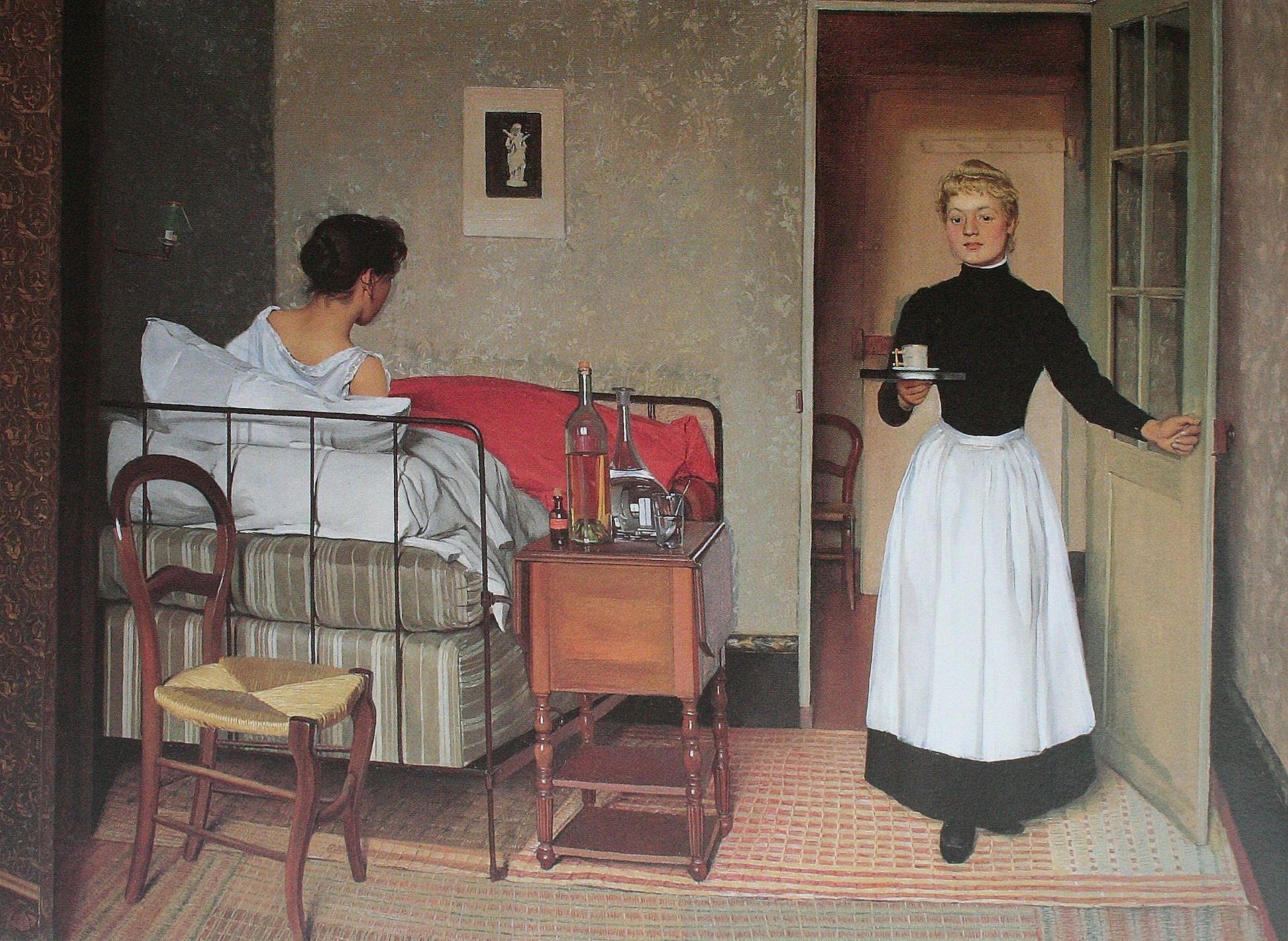
Félix Vallotton:
La Malade (The Patient): Hélène Chatenay (1892)
"This Illness does not render her any more special than she already was, which was always considerable."
Illness seems different and distinct from mere sickness. Sickness seems an interruption, something contracted then resolved as a matter of course. In most cases, one simply recovers from the flu without long-lingering symptoms. Illnesses seem unique in that recovery's not presumed. They typically do not just take care of themselves. They need treatment. Sometimes, a course of medicine counterbalances the intrusion; often, more extensive interventions: surgery, quarantining, physical therapy, hospitalization, psychological counseling. Some of these responses might continue for the rest of the patient's life while others come in passing. One does not necessarily ever recover from an Illness. The Parkinson's my mom contracted at sixty was still with her when she died at ninety-something, though it had progressed considerably from its beginning as a questionable quivering into a totally debilitating presence. A person might be rendered free of cancer, but they're not considered "cured" until cancer-free for five years.
The Muse found a lump in her throat and to her credit, she followed up on it. I consider this act courageous.
Backdooring
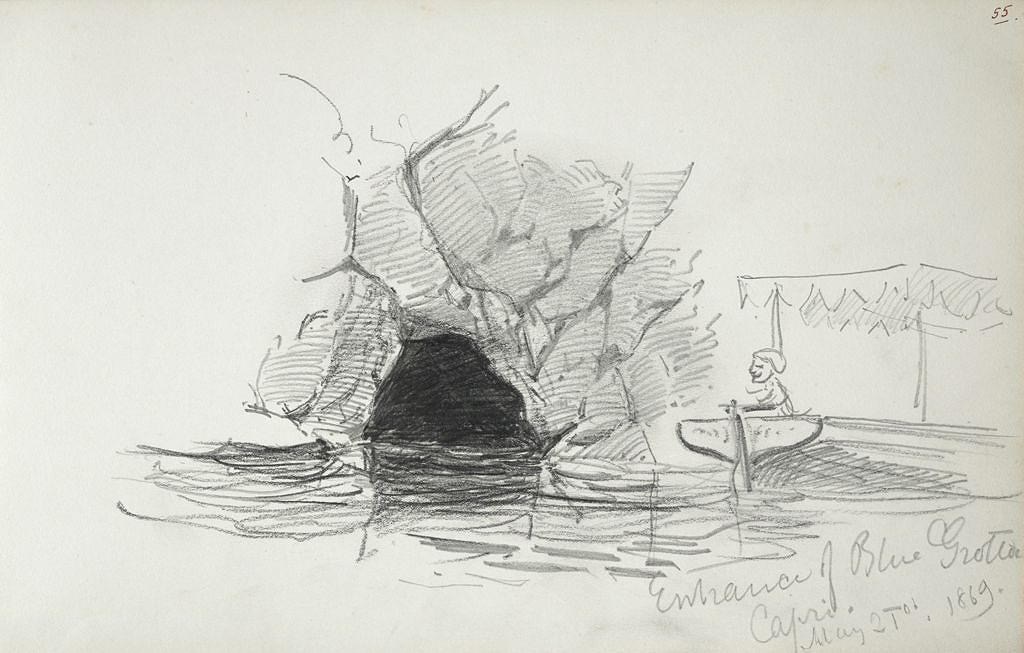
John Singer Sargent:
Entrance of Blue Grotto, Capri (May 21 1869)
"Wider recognition only spoils the intention."
The Muse and I have been trying out new routes between our heres and theres. Most prominent at the moment, a route through Washtucna, a town of little note and far less substance. Access comes via two lane blacktop, up through the very least densely populated portion of our county and into an even more lonely stretch in an adjacent one. The road twists unconscionably, which makes for slow going. Yet we've taken to making our way up the Road To Washtucna wherever we head West, toward Seattle. Faster ways exist, though none shorter. This route features no semi-trucks, the bane of every traveler's adventures. It's a backdoor route, one not obvious to first-time tourists and uninteresting to those who equate freeway driving with freedom. We can toodle our way away and back again without any fear of anyone spotting us getting away or returning. We're Backdooring.
The older I get, the less interested I seem to be with status and notoriety.
Aspect
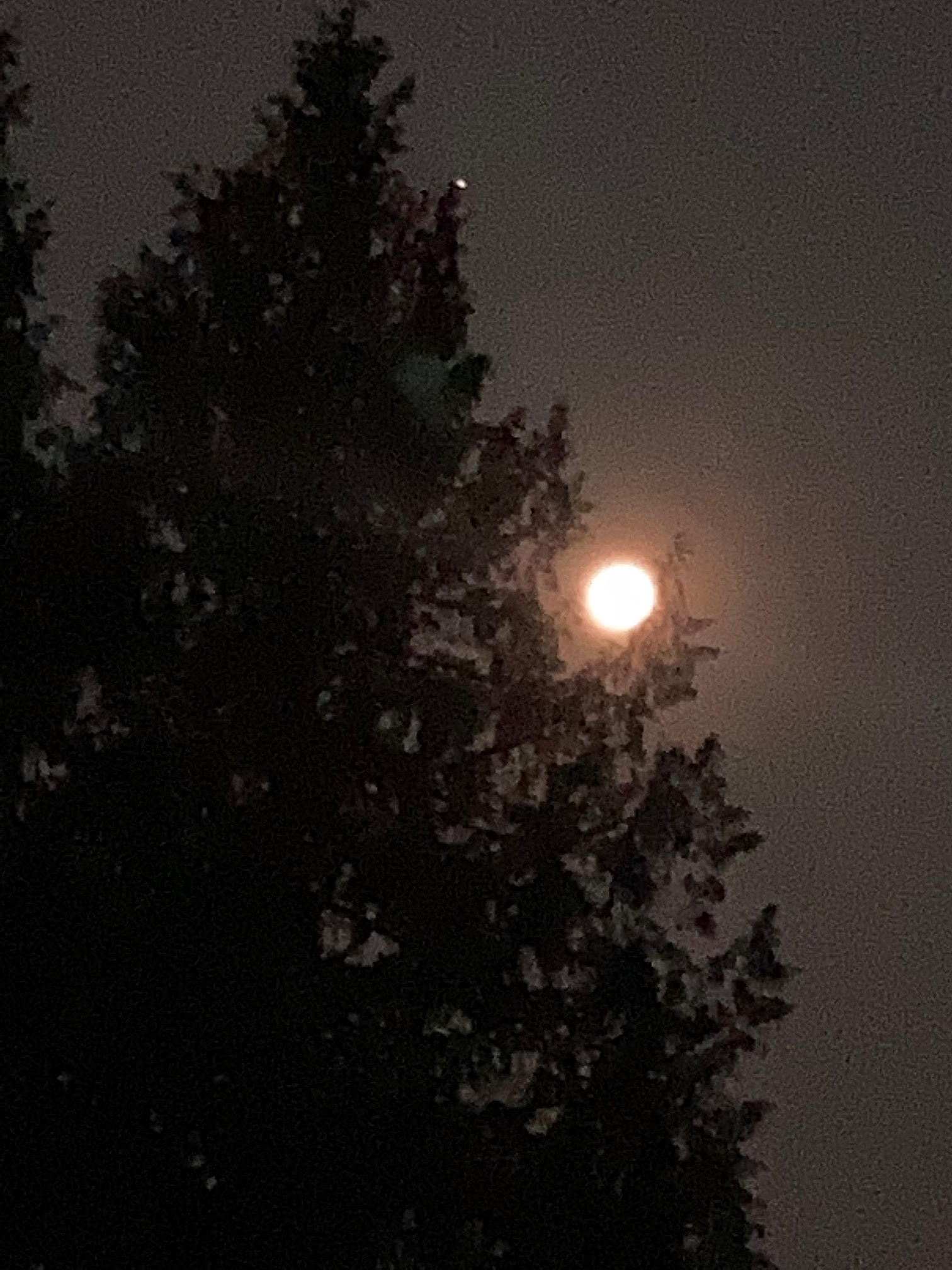
Moon over Stevens Pass 9/11/2022, 3am
" … conspiring to escape my defenses …"
Up in these woods, this weary world seems fresh. A full moon crawls beyond a sixty-foot cedar to stare down unblinking upon my very early morning doings, and finds nothing wanting, nothing awry. All seems perfectly right with this world in this moment, travails intact, problem unsolved. The Aspect here precludes the usual fears. I feel suspended above and safely beyond wanting. All seems calm. All bright.
The Muse announced the presence of her cancer in a brilliant social media post, one which nobody who knows her could have possibly mistaken her not having been its author.
Offlining

Salvator Rosa:
Diogenes Casting Away His Bowl (1661–1662)
"I might be someone other than who I pretend to be …"
My great great grandmother, born in the eighteen forties, lived to be almost a hundred. During her life, she experienced in her youth a medieval-quality existence as an immigrant on two great migrations from New York into Florida following Gadson's campaign and then on into Texas. As a young wife, she traveled the Oregon Trail clear to Oregon on horseback. By the time she died, WW2 had ended. People were flying. Just a few years before I was born, this world had already invented most of what we would readily recognize today, but in more primitive forms. Now, all those newspapers and magazines, radios and televisions visit us via a single medium, one we carry access to with machines small enough to comfortably fit into a pocket and powerful enough to utterly distract us from ourselves. My great great grandmother was a life-long pioneer. Her great great grandson, a slave.
I admit my addiction.
TheReveal
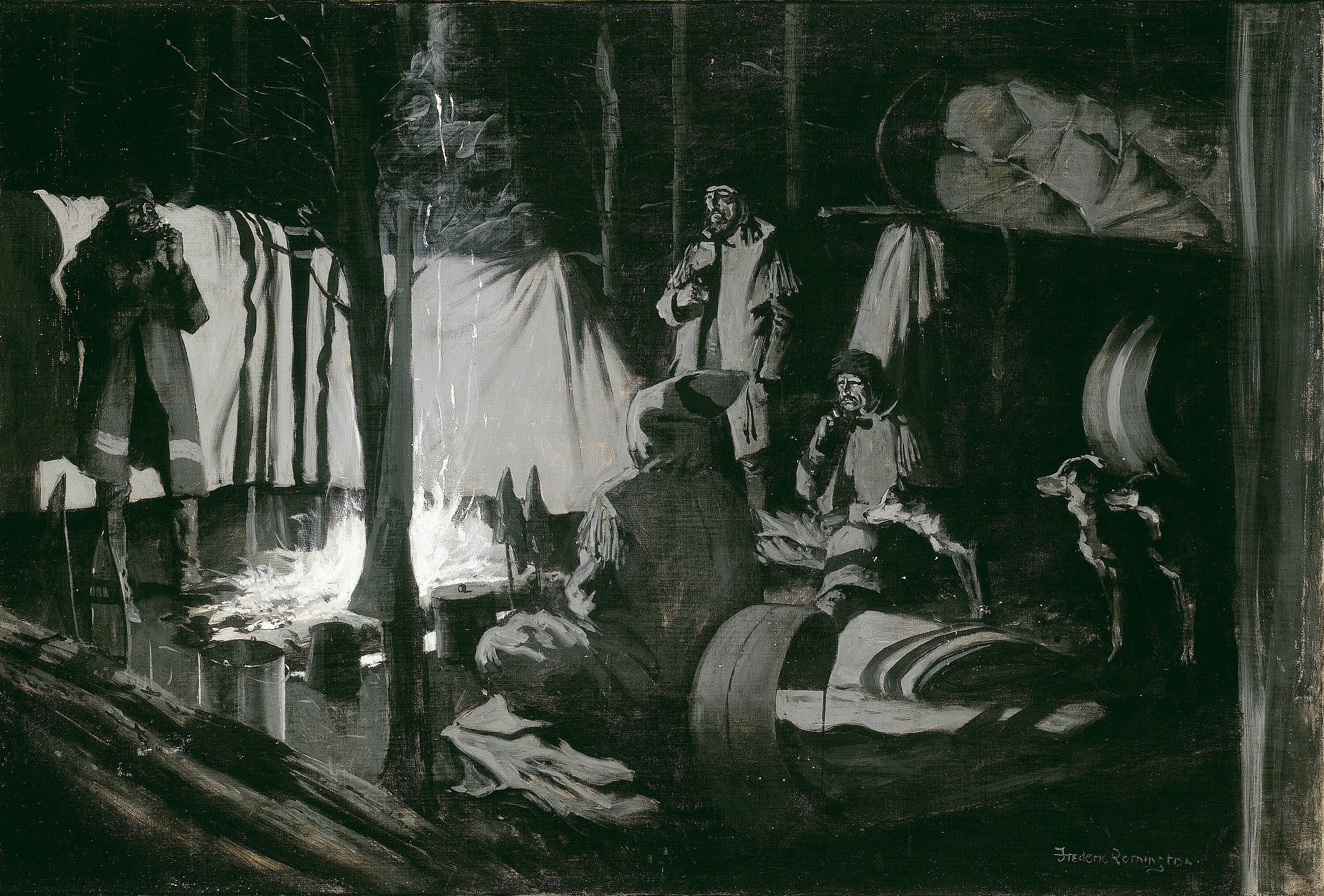
Frederic Remington: First and Best Camp of the Trip (1895)
"Each a detective, none a master."
We believe in TheReveal, that whatever mystery harasses us, we will eventually come to understand and thereby resolve it. This seems an inherently naive notion, since this world, this universe, seems more vast than even our imaginations might ever grasp. Still, we entertain and employ ourselves seeking answers, often to the wrong questions. We collect pieces to these puzzles in the belief that we might one day fit them together and release the tension. In Hardy Boy novels, this release came about in TheReveal chapter, where all the story's threads came together to affect resolution. The reader would learn who done it? and the perpetrator would be carted off to jail. Frank and Joe might receive the heartfelt if slightly surprised appreciation from the police chief or their detective dad, then go on to stumble upon another mystery needing resolution.
I am here to reveal that life does not often work like that.
RealChange
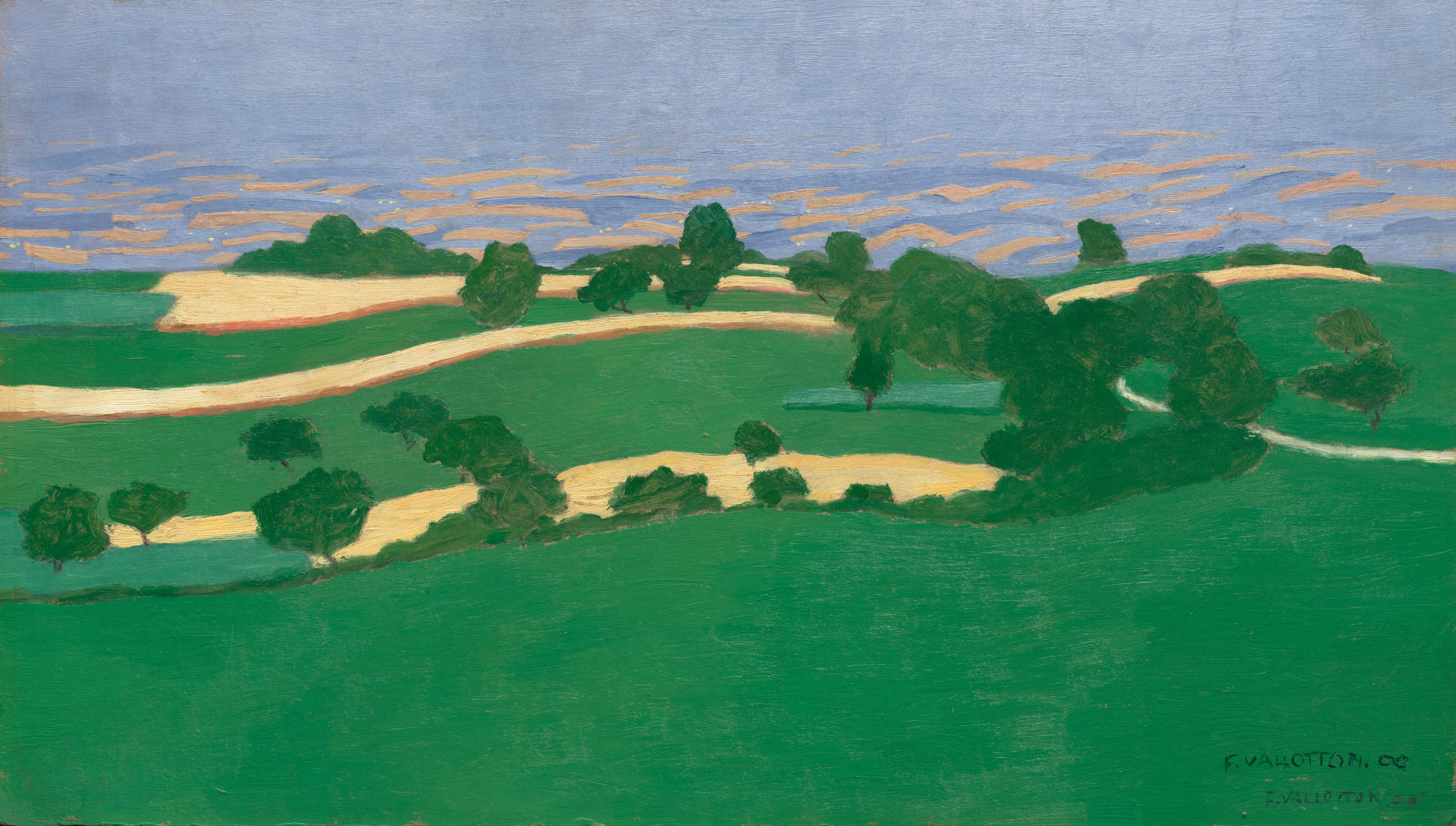
Félix Vallotton: Corn Fields (1900)
"Things will never be the same again."
Change seems the real constant in this world, in this life. Stasis seems impossible, yet we're weaned to wish for difference, not stasis. We genuinely fail to see the essential contradiction in our constant striving for change, RealChange. I doubt that I would recognize the real McCoy if it sat on my face. The real McCoy might look more like nothing different at all. It might seem so familiar as to appear utterly unimportant. Remember when The Damned Pandemic forced us all to take up a sedentary lifestyle, always staying home, rarely roaming anywhere? That was a real and significant change to which many reacted by feeling bored and uninterested. We ached for the same old and called that different. Change seems the constant, constancy the real difference.
The Muse and I are poised upon the cusp of a significant change.
Becausing

Attributed to Frans Pourbus, the Younger:
Profile Portrait of a Lady (1569 - 1622)
"Just let that mystery be."
Because belongs to that august class of words which carry no specific meaning. It seems to mostly play the role of placeholder, standing in for some more substantial explanation. It pretends to explain something, but utterly fails, except in omission. It seems to say, "Don't ask. I cannot tell," more of a brush-off, really. In the absence of a root cause, just say, "Because," just because.
Psychologists insist that we become more or less the sum total of our explanatory stories.
Dazing

Rembrandt van Rijn: Old Woman Sleeping (c. 1636)
" … done Dazing for this waning season."
At this latitude, summer changes like a supertanker turns, in a wide, almost indiscernible arc. I might be excused for thinking the first hints mere feints, practice moves with no conviction behind them. Slowly, excruciatingly slowly, though, the easy mornings finally give way to presenting high fifty degree temperatures and I gratefully don a sweatshirt and happily bid goodbye to my sweaty pillows. As almost unbearable as the nights have been, the days have been absolutely overwhelming me. If I was not done with my outside chores by eight, at the very latest nine am, I could forget about completing them that morning. I might occasionally squeak in an additional couple near the end of the day, having by then once again grown somewhat accustomed to the insult to the point where I could complete 'em in hundred degree shade. The bulk of my August days were spent Dazing, in hot weather hibernation, idly gazing, almost dozing. It was my final defense.
Let the record show that I didn't completely collapse, however otherwise misleading appearances might have seemed.
Laboring
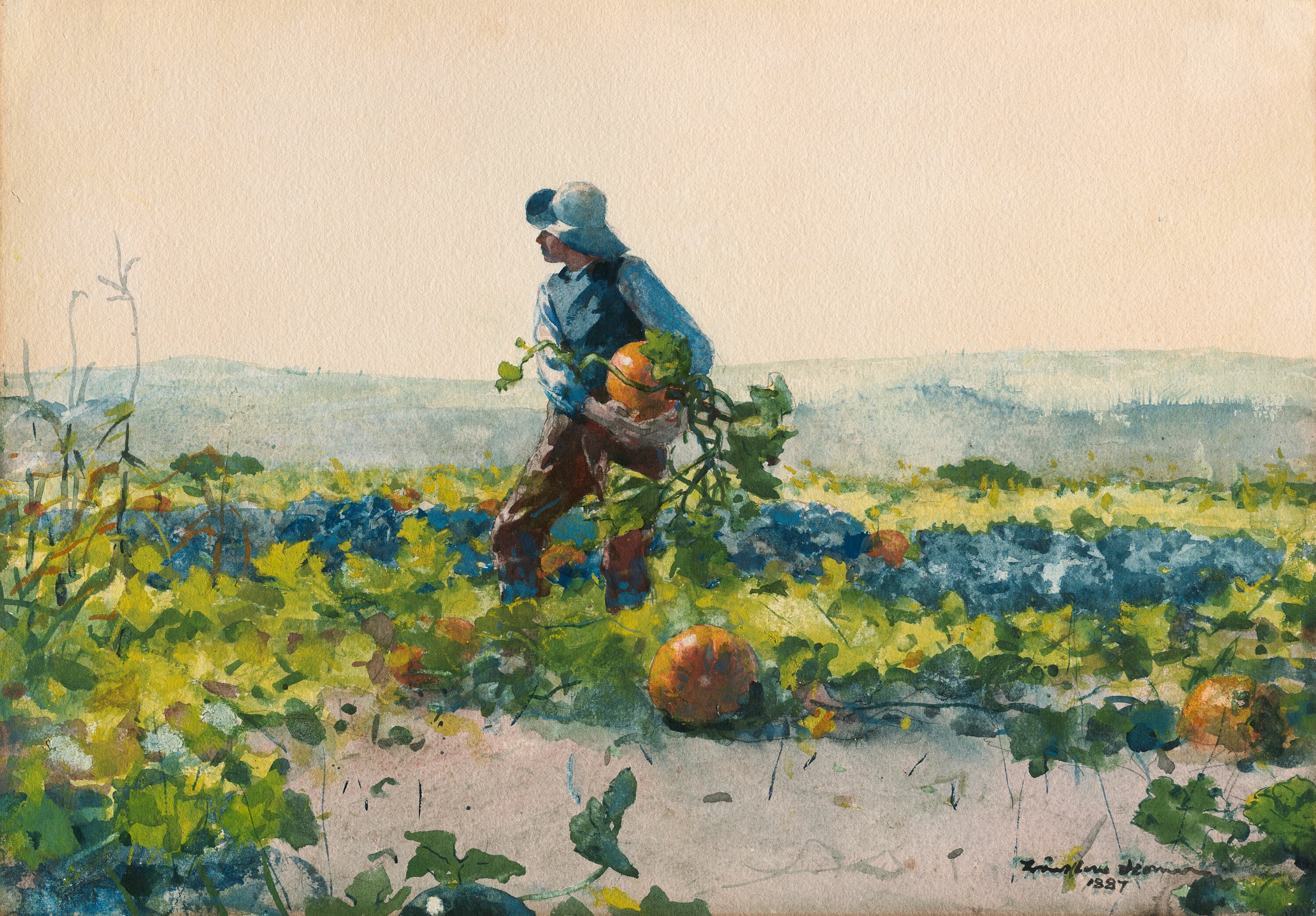
Winslow Homer: For to Be a Farmer’s Boy (1887)
" … we observe it from a safe distance in the shade."
Labor Day might be the only holiday we do not celebrate. Oh, we observe it, or we certainly try to observe it, but something in the American character steadfastly refuses to celebrate Laboring. Our native Yankee genius has always been attuned to figuring out ways to avoid Laboring instead, and specializes in producing labor saving devices. We secretly consider anyone laboring to either be a convict, sentences to a term at "hard labor," or a fool, too simple to concoct a way to avoid the sweaty stuff.
We paradoxically, though, claim to revere the hard worker.
Pa

Hercules Seghers: Enclosed Valley (c. 1623–30)
" … I love my overalls …"
Years ago, when my son was barely one year old, my first wife and I bought our first house. It wasn't much. Two bedrooms featuring peeling wallpaper, worn paint, and a basement given over to cobwebs and mouse poop, but we set about fixing it up, though neither of us considered ourselves qualified. The interest rate on the mortgage was fifteen and a half percent, the best we could bargain for under Reagan's grand prosperity strategy, which left us feeling as if we'd landed in the middle of The Great Depression. The old guy we'd bought the place from left a weary pair of overalls on a basement shelf. I washed them up and tried them on, never having previously had the pleasure, and took to wearing them as I labored around the place. As often happens for me, that clothing imparted a new identity to me. I became 'Pa' whenever I wore them, a character loosely based upon an actor in a popular television series at that time, The Waltons.
I guess I needed a role model and imprinted upon him.
NextChapter
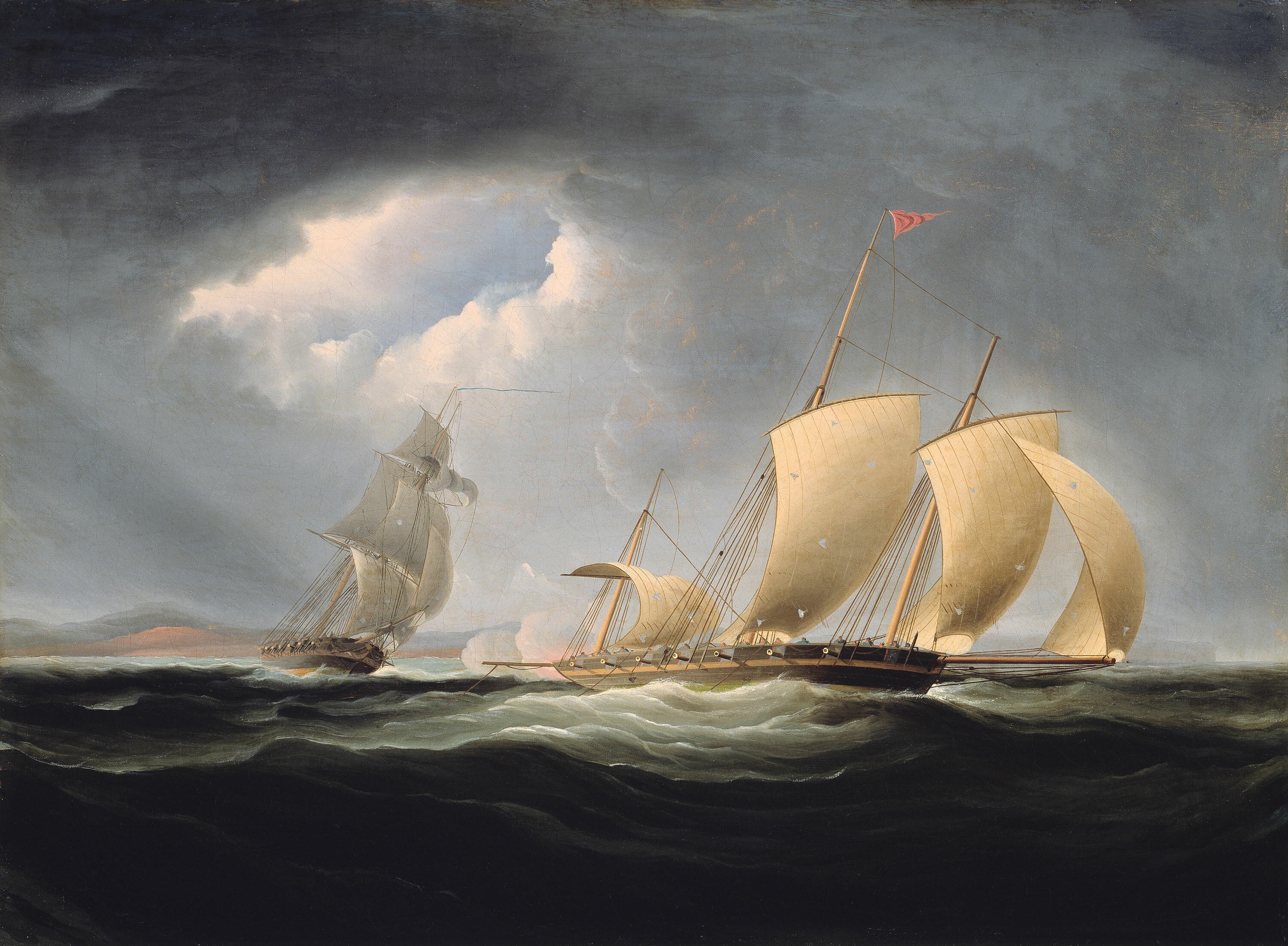
Thomas Birch:
Capture of the Tripoli by the Enterprise (1806/12)
" … I'll still already be gone by then."
My experience of this life so far strongly suggests against the existence of sequential anything. Sequential seems a hypothetical, one possible alternative rarely actually encountered; a theoretical, all things being equal, when things only very rarely end up being very equal. I skip around instead. I might set off in some definite direction, following the simplest of instructions, but soon encounter some distraction, some unexpected abstraction needing fleshing out. The road not taken seemed the very soul of straightforward. The road actually traveled seemed to have meandered.
Oh, plans rely almost entirely upon sequential construction.
Anti-
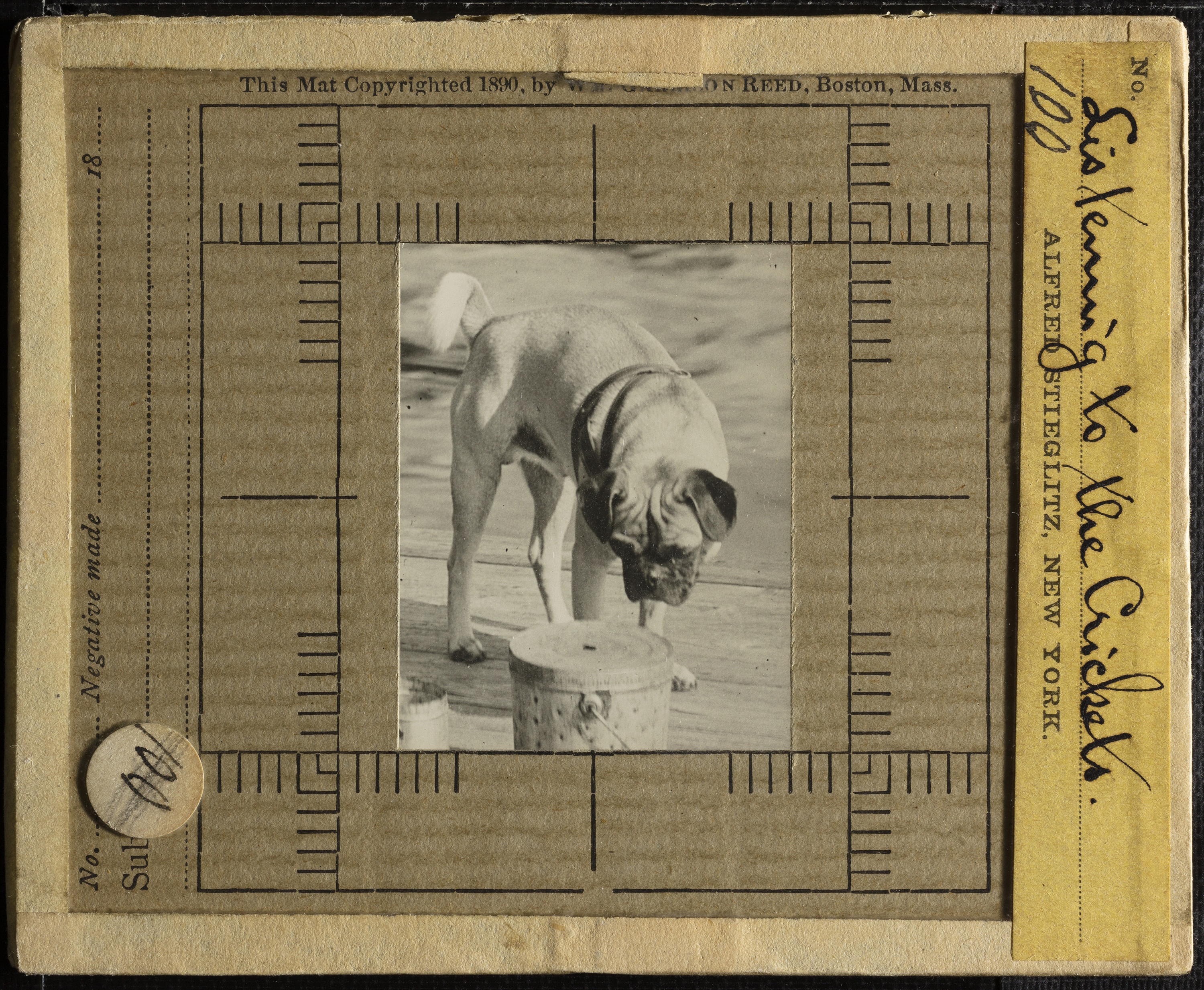
Alfred Stieglitz: Listening to the Crickets (c. 1900)
"Impossible and necessary …"
I this week declared myself Antifa because I consider myself vehemently anti-fascist. Who wouldn't be? An old acquaintance called me out, noting that a shadowy group considered to have been responsible for much anonymous street violence travels under the Antifa label, but then so, too, does a deeply anonymous collective of hackers who have uncovered considerable elite wrong-doing, and so, too, does a loose association of equality-seekers who protest financial elitism, which seems the very soul of fascism. The problem might lie in the Anti- label, what philosophers refer to as the 'negative space' identifier. Yesterday, as my dentist fitted a new cap onto one of my molars, he asked me to try to determine if it fit properly, a state I might recognize because I wouldn't notice any difference when I bite down. A positive space target would have provided an experience from which to judge success rather than the absence of an experience. We worked until I decided that I couldn't feel any difference, but I left with doubts that I'd succeeded in properly reporting success. Negative spaces work like that.
My Anti- feelings toward fascism fail to characterize what I'd consider an adequate replacement for fascism's presence.
FairWeather
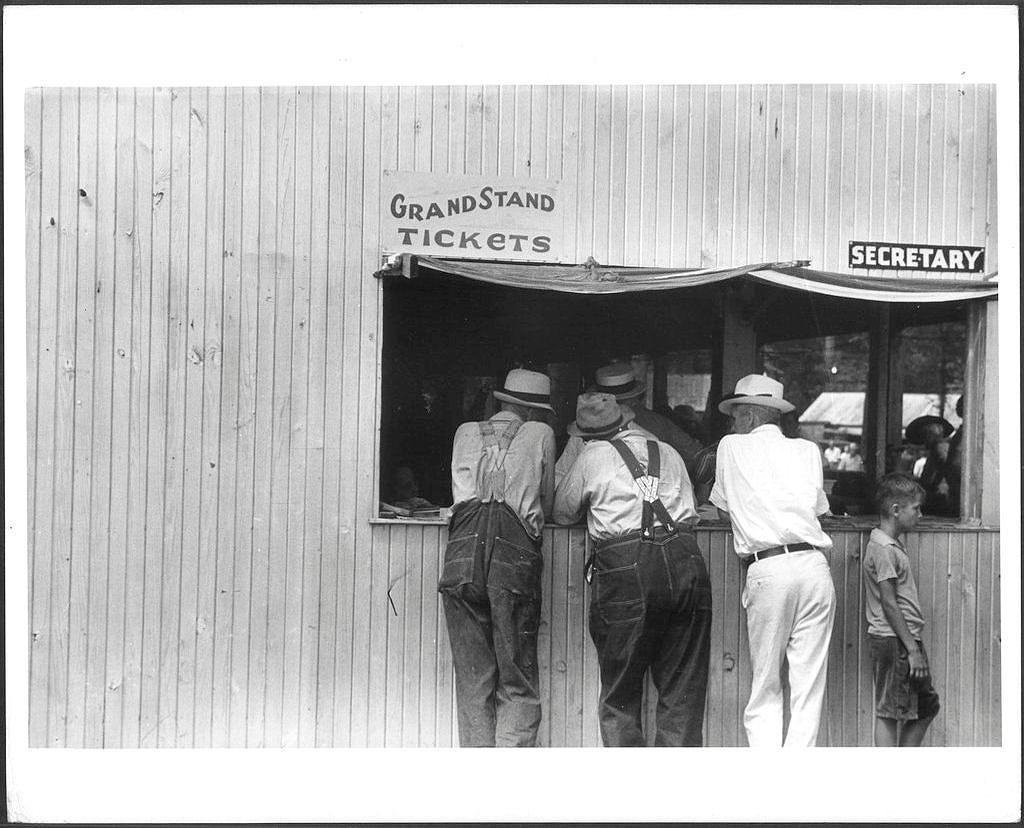
Ben Shahn:
Untitled [county fair, central Ohio] (August 1938, printed later)
"Nostalgia seems a much more reliable companion …"
Summer's finished. It just doesn't quite realize it yet. As if to demonstrate its remaining vitality, the temperature pushed a hundred again, but the people long ago grew accustomed to even that extreme. They stream to the Fair, regardless. So do The Muse and I. We come to work the Democrat booth, a fabled responsibility. Occasionally, some delusional Q fan or Trump supporter has been known to wander by and harass whomever's working the booth, so we're wary. Cowboys wander by with smirks on their faces and "Brandon" on their lips, quietly shaking their heads as they pass. Our people stop by carrying their enthusiasm with them, grateful for our presence. It's not paranoia if they're really out to get you. They're really out to get us.
The booth has a grandstand view of the fair's entrance, a broad sidewalk where everyone entering must pass.


